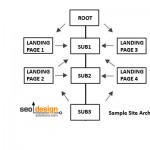Anyone who tells you that using SEO or producing first page search engine rankings “does not matter“ in today’s hyper-competitive online agenda, isn’t completely aware of just how much each keyword represents as a unique opportunity to reach more customers or more specifically “your ideal customer”, first.

Keyword Research, SEO and Competitor Analysis
First Come, First Serve Means More Online than Just a Cheeky Cliché
Those who rank in the top positions above the fold (above the scroll line) on a search result page have a higher likelihood of reaching a motivated prospect with the right message, first. As a result, they have first dibs on being the ones to encourage them to complete a contact form, place an order, etc. vs. someone on page 3 of the search results. Sequence is important, and the lower your website is on the totem pole, the less likely they are to engage your offer.
In order to defend your website from competitive blind spots, you should delve into the fundamental metrics of competitive research such as “who?, what?, where?, when?, how?” and “why” to determine why it should matter and how to apply it to your advantage.
Keep in mind, that in order to convert from SEO or PPC, people actually have to click your result instead of the other 9 on the page next to it. Choosing compelling titles and supportive modifiers is equally as important and keywords utilized for SEO value.
Not to digress from the topic of page one positioning, but with SEO, nothing happens until a click-through occurs in the SERPs (search engine result pages). It’s not always about dry / technical titles and snippets in the meta data, using enticing modifiers such as “superb, superior, impeccable, exquisite, fabulous, impressive, invaluable” and other flavorful adjectives can increase sales conversion vs. just funneling generic traffic to your pages to see what sticks.
Keyword Search Share, Why it Matters?
Each keyword has a particular search share and that share represents a potential dollar amount when translated by conversion analysis (x amount of impressions / y amount of sales, leads or “the preferred action” = the % of conversion).
Without knowing what the percentage of search share your website currently exhibits for which keywords means you could be wasting time on ineffective keywords. Also, without benchmarks, checks and balances, you will have no means to measure or enhance performance.
This analysis incorporates metrics such as the volume of existing traffic, historical trend data (the history or volume of searches for the root phrase) as well as the stemmed variations people are using “right now” that include that keyword and include modifiers such as affordable, best, leading, pricing for, etc. as well as their volume of subordinate search share.
To ignore keywords(because their ceiling is too high), dismiss them as irrelevant (because you are not targeting them) or fail to see how acquiring strategic positioning through first page results for popular industry-specific or common keywords means you are essentially “leaving money on the table” for competitors.
If there are (a) ppc thresholds where people are “bidding up” a phrase (b) significant search volume (c) a low threshold of competition, then such a keyword is the most likely candidate for testing conversion rates.
Never think of it as one and done, but on the contrary, think of keywords as part of a master strategy to intersect your message at infrequent intervals through pull based marketing “when they need it most, when consumers conduct a search”.
Are Keywords Keys to the Kingdom of Conversion?
Truly understanding keywords and keyword positioning is like having the keys to the kingdom of conversion; when they search, your there, with the right message at the right time. Timing is everything as far as search is concerned. Relevance is born on a whim as a subjective impulse “to do” or “to achieve or accomplish” moves into the forefront of a consumers daily surfing excursion, then usually there are dollars attached.
By coupling your pages with action words and landing pages that have a clear conversion objective, you can drive dozens of visitors to “the right pages” and experience higher conversion with less dependency on traffic for traffic’s sake. The more targeted the keywords, the higher likelihood for conversion. Although it sounds simple, with SEO it is a long term process, but once there, you don’t have to pay per click.
The value is in embracing multiple channels to reach the same objective. If the objective is to increase sales by 32% for example, then who cares if it takes 3 keywords or 30 to facilitate that, the point is you can compound keywords to produce a specific effect and eventually refine your keywords to separate real performers from those that simply posture in the herd.
Should You Pick Less Competitive Keywords at First?
If you provide SEO services, then you are bound to hear this question often. Should we pick the less competitive keywords or go after the main phrase? The answer to this question is worth its weight in gold. Yes, you should target the less competitive keywords until you gain your footing, but gradually incorporate more competitive keywords over time as the site develops authority.
Ideally, you should build the site architecture with the competitive keyword in mind, then use (1)content (2) internal links and (3) deep links from other websites (to specific pages with specific anchor text) to give your website the needed authority to push past competitors who are resting on their laurels.
The catch however is, what is competitive now will become less competitive over time and a website constructed the right way will naturally consume a broader array of keywords and phrases naturally as it gains more authority.
Cultivation of that authority is the objective of SEO, not just rankings, but just like you need to understand the end game in chess based on your opening strategy (aggressive, tactical, passive, etc.) those initial moves create integral benchmarks in the playbook as things pan out.
Just like in chess, if you sack a piece too soon, then you will never know “what it could have done for you” later in the end game. Keywords if undeveloped have the same fate. They (your keywords) must all work together to deliver the right type of traffic to the right destination where it can convert. If it does, then it is only a matter of scaling the effect or layering additional keywords that offer tangible results over time.
If a keyword delivered an extra 20 sales per day or 5 extra leads, then you know it is an effective keyword. I have discussed the SEO ceiling in previous posts which represents the natural ranking power a website exhibits at a given time. Depending on that ceiling, keywords equal to or below that “threshold / relevance mark” can be easily acquired with minimal effort by a website with enough content, popularity or links.
The only difference between a competitive keyword is the perspective of how high is the SEO ceiling for the optimized website. Just as you can compare a like to a like to gauge relativity, comparing an authority site that can rank for a keyword with 50,000,000 competing pages on a whim with a brand new website with 10 page of content soaking wet is not a fair comparison for contrast.
The point being, eventually, any keyword is attainable, but the way that you optimize (1) your root keywords and (2) your supporting keywords variations ultimately sculpt the progression of how a website raises up in (a) rankings and (b) relevance for a distinct theme of related phrases and modifiers that drive traffic.
Rankings matter as long as they produce conversion and revenue, so instead of trying to hang your hat on them completely in an attempt to make them the cure all your online marketing needs, look at them as pieces of a puzzle that represent a bridge of potential.
Depending on how frequently those bridges are used is what determines a good investment of time, energy or resources to acquire a specific ranking vs. consuming the market whole one keyword at a time as a result of your domains authority.
Instead of chasing after keywords, you simply look at the ones producing the most revenue in the niche, start with stemmed variations then devour the root theme over time.











Great post Jeffrey, thanks.
There is a saying that patience is a virtue, and this is evident when it comes to choosing less competitive keywords first. Sadly – but understandably – most website owners are just not patient enough to wait for the long term results of SEO. They fail to understand that SEO is complex and dynamic.
That for clarifying some of these complex stuff in this post.
I agree Mauco, one point they also fail to realize is you can target hundreds of keywords simultaneously (while you wait).
Better to test and confirm the “right selection” of keywords first, before losing months over obsessing on one keyword or phrase alone.
Nice post but you know I don’t find any broad difference between less competitive and more competitive keywords.For me a keyword is a keyword.For example if I am giving web designing service then ‘web design service’ is my keyword and web design service is a tough keyword ….
Anyway nice post
Thanks
The point is two fold (1) know your target phrase but (2) enjoy some rankings along the way through berry picking stemmed variations of the root phrase. The keyword you selected is competitive and many companies have spent thousands of hours building links and optimizing for it, good luck targeting that alone without optimizing supporting material to surpass the goal.
What a nice blog you have..thanks for all this information
Nice post but I liked the discussion between Sourav and Jeffrey…This prob also happened to me…Website design was my primary keyword but it failed to appear in the SE rankings…I then tried custom web design and web design California to come in the SE rankings. Another thing I will say that target geo specific location in SE first….
Any comments Jeffery….
Thanks
I agree! Isn’t it something like 60-70% of people click on results above the fold? People that say positioning are whack! It totally matters (even more so when you don’t have it)!
@Neo:
People must remember that more traffic is not always the solution, higher conversions are. So, if you have 25% more traffic from a broad keyword but your conversion rate is under 5%, then you are better targeting a less competitive or series of less competitive keywords (GEO Targeting included) to (1) lower bounce rates (2) rank higher (since there is less competition) and (3) get a higher conversion from more targeted traffic.
@Jacob:
I agree, Top 10 is nice, but top 3 is where it’s at.
Thanks for commenting to you all.
It is a great post and every point is so true.
Thanks for the good post.
nice blog archive….n good information …
i like it….
keep going….
u r the best services……..
people will knows u n reach u…
thanq u